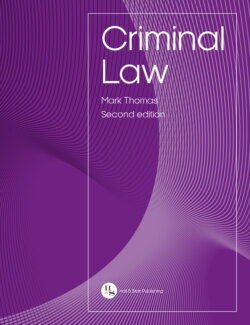Читать книгу Criminal Law - Mark Thomas - Страница 109
На сайте Литреса книга снята с продажи.
2.7.3New and intervening acts
ОглавлениеA break in the chain of causation, also known as a novus actus interveniens or ‘new and intervening act’, will rid the defendant of liability for the consequence of his original act. Although the defendant will remain the factual cause of harm, the intervening act may supersede the blameable element of the defendant’s conduct, thus ridding him of criminal liability for the end result. Remember, though, that he may still be liable for the original act or for an attempt.
The chain of causation may be broken in three distinct circumstances:
•the act of a third party (see 2.7.3.2);
•an act of the victim (see 2.7.3.3); or
• an unforeseeable natural event, sometimes called an ‘act of God’ (see 2.7.3.4).
Lord Hoffmann in Empress Car Co (Abertillery) Ltd v National Rivers Authority [1999] 2 AC 22 stated:
[I]t is of course the causal significance of acts of third parties (as in this case) or natural forces that gives rise to almost all the problems about the notion of ‘causing’ and drives judges to take refuge in metaphor or Latin.
Each of these three circumstances will be considered below. However, it is first essential to consider the general principles that arise when one considers new and intervening acts.
